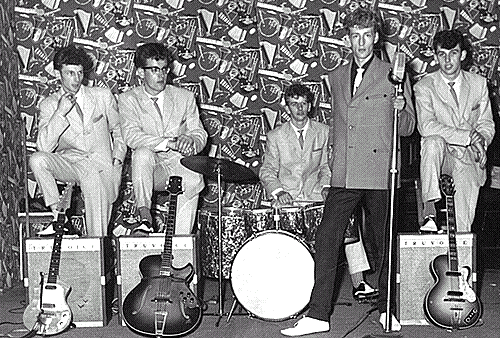
Rory Storm and the Hurricanes
Rory Storm (born Alan Ernest Caldwell; 7 January 1938 – 28 September 1972) was an English musician and vocalist. Born in Liverpool, Storm was the singer and leader of Rory Storm and the Hurricanes, a Liverpudlian band who were contemporaries of the Beatles in the late 1950s and early 1960s. Ringo Starr was the drummer for the Hurricanes before joining the Beatles in August 1962, replacing original drummer Pete Best.
The Hurricanes were one of the most popular acts on the Liverpool and Hamburg club scenes during their existence, although their attempt at a recording career was not successful. They released only two singles (and one additional compilation track) during their early 1960s heyday, and none of their material made the charts. Their second and final single was a version of the West Side Story song “America”, and was produced by the Beatles’ manager Brian Epstein.
In 1959, Storm’s group consisted of himself, Paul Murphy, and Johnny “Guitar” Byrne all performing on guitar and vocals, Reg Hale (washboard) and Jeff Truman (tea-chest bass). “Spud” Ward, a former member of the Swinging Blue Jeans, later played bass guitar. Storm met Ringo Starr at a talent contest called “6.5 Special”. Starr had previously played with the Eddie Clayton Skiffle Group and was then drumming with a group called “Darktown Skiffle”. Starr’s first concert with Storm was on 25 March 1959, at the Mardi Gras in Mount Pleasant, Liverpool.
Storm changed the name of his group to “Al Storm and the Hurricanes”, then “Jett Storm and the Hurricanes”, and finally to “Rory Storm and the Hurricanes”. The original lineup was Storm, Byrne, Ty Brian, Lu Walters, and Ritchie Starkey (drums).
The line-up of the Hurricanes finally solidified with Storm (vocals), Byrne (rhythm guitar), Ty (Charles) O’Brien (lead guitar), Walters (bass guitar/vocals) and Ringo Starr.
The group played at the Cavern Club with the Cy Laurie Jazz Band on Sunday 3 January 1960, and a week later supported the Saints Jazz Band and Terry Lightfoot’s New Orleans Jazz Band.
Storm and the Hurricanes received the most votes in the first Mersey Beat magazine poll, but many votes were disqualified as they had been posted from the same place at the same time and were written in green ink; although never proven, it was thought that Storm had posted the votes. This meant that the Beatles reached the top position, with the Hurricanes coming fourth, even though the Beatles had also been sending in extra votes themselves. Storm was often photographed for the magazine, such as being surrounded by nurses when he left the hospital after breaking a leg during a performance, or playing for the Mersey Beat XI football team.

In 1967, at the age of 29, O’Brien collapsed on stage during a performance, and years later, he would die from complications after an appendicitis operation. Storm disbanded the Hurricanes and became a disc jockey.
On 28 September 1972, Storm and his mother were both found dead at Hurricaneville. The postmortem revealed that Storm had alcohol and sleeping pills in his blood (as had his mother), but not enough to cause his death, which was ruled accidental. Although it could not be proven, it is thought that his mother had committed suicide after finding Storm’s body.
Ringo Starr pays tribute to him in his songs “Liverpool 8” on his Liverpool 8 album and “Rory and the Hurricanes” on his Postcards from Paradise album.
From Wikipedia, the free encyclopedia
